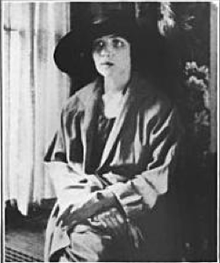Graciela Mandujano
Graciela Mandujano was a Chilean politician and feminist.
Graciela Mandujano | |
|---|---|
 | |
| Born | 1902 |
| Died | 1984 (aged 81–82) |
| Nationality | Chilean |
| Occupation | Politician, editor |
Biography
A graduate from a pedagogical course in the University of Santiago, she was sent by the Chilean government to visit the Panama–Pacific International Exposition in San Francisco, and was the Chilean official delegate to the Pan-American Conference of Women in Baltimore, organized by the National League of Women Voters.[1]
Mandujano continued her studies at Columbia University and lived in Varick House Settlement,[2] and was the editor of the Pan-American Magazine in New York City.[3] A suffragist, in 1922, Mandujano worked with other women to organize the Partido Civico Femenino (Women's Civic Party), which, among its goals, sought the woman's right to vote.[4] She was a co-founder of the Unión Femenina de Chile (Women's Union of Chile) with Aurora Argomedo on 26 October 1927.
She later served as secretary-general of Movimiento Pro-Emancipación de las Mujeres de Chile,[5] which she co-founded on 11 May 1935 together with Elena Caffarena, Susana Depassier, Flora Heredia, Herta Hoschhauser, Angelina Matte, Aída Parada,[6] Olga Poblete, María Ramírez,[7] María Rivera Urquieta,[6] Eulogia Román, Domitila Ulloa, Felisa Vergara, Marta Vergara[7] and Clara Williams.[6] Aurora Argomedo, Delia Ducoing, Adela Edwards de Salas, Elvira Roga, and Elcira Rojas were also contemporaries.[8] She was a member of the directive board of the Femeninas Federacion Chilena de Instituciones Femeninas.[9] In the role of government adviser of Chile, Mandujano attended the ILO's 1941 International Labour Conference at Columbia University.[10]
References
- The Literary Digest (Public domain ed.). Funk & Wagnalls. 1922. pp. 36–.
- Price, Willard, ed. (1917). World Outlook (Public domain ed.). Board of Foreign Missions of the Methodist Episcopal Church. pp. 18–19.
- Pan American Magazine (1919). Pan American Magazine (Public domain ed.). Pan American Magazine. pp. 22–.
- Power, Margaret (1 November 2010). Right-Wing Women in Chile: Feminine Power and the Struggle Against Allende, 1964-1973. Penn State Press. pp. 55–. ISBN 0-271-04671-6.
- Rosemblatt, Karin Alejandra (27 November 2000). Gendered Compromises: Political Cultures and the State in Chile, 1920-1950. University of North Carolina Press. pp. 113–. ISBN 978-0-8078-6095-3.
- Poblete, Olga (1993). Una Mujer, Elena Caffarena (in Spanish) (1a ed.). Santiago: Ediciones la Morada/Editorial Cuarto Propio. p. 42. ISBN 978-9-562-60048-4. Retrieved 1 July 2015.
- Cruz, Lucía Santa (1978). Tres ensayos sobre la mujer chilena: siglos XVIII-XIX-XX (in Spanish). Editorial Universitaria.
- Lavrin, Asuncion (1998). Women, Feminism, and Social Change in Argentina, Chile, and Uruguay, 1890-1940. University of Nebraska Press. pp. 19–. ISBN 0-8032-7973-6.
- Rock, David (1994). Latin America in the 1940s: War and Postwar Transitions. University of California Press. pp. 176–. ISBN 978-0-520-08417-9.
- Lubin, Carol Riegelman; Winslow, Anne (1990). Social Justice for Women: The International Labor Organization and Women. Duke University Press. pp. 62–. ISBN 0-8223-1062-7.